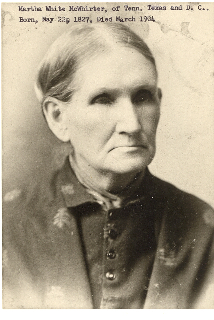

Queer Places:
Central Hotel, E 2nd Ave & N Main St, Belton, TX 76513
Rock Creek Cemetery, 201 Allison St NW, Washington, DC 20011, USA
 Martha White McWhirter (May 17, 1827 – April 24, 1904), founder and leader of the Belton Woman's Commonwealth, was born on May 17, 1827, in Gainesboro, Tennessee, the daughter of a Jackson County planter. In 1845 she married George M. McWhirter, an attorney and farmer.
Martha White McWhirter (May 17, 1827 – April 24, 1904), founder and leader of the Belton Woman's Commonwealth, was born on May 17, 1827, in Gainesboro, Tennessee, the daughter of a Jackson County planter. In 1845 she married George M. McWhirter, an attorney and farmer.
The McWhirters moved to Bell County, Texas, in 1855, and settled first on Salado Creek, near the site of present Armstrong. Nine or ten years later they moved to Belton, where George McWhirter operated a store and had an interest in a flour mill. The McWhirters had twelve children, only six of whom survived.
Martha McWhirter had joined the Methodist Church in Tennessee at the age of sixteen, and in Belton she and her husband helped establish the interdenominational Union Sunday School, to which they remained loyal even after the community acquired a Methodist congregation in 1870. She also led a women's prayer group that met weekly in the members' homes. In 1866, after the deaths of her brother and two of her children, she began to believe that God was chastising her. After a prayerful night she had a vision that convinced her that she had been "sanctified," or filled with the Holy Spirit. She shared her revelation with the women in her prayer group, and other members began to pray successfully for sanctification. Mrs. McWhirter's deepening commitment to unorthodox religious views eventually caused a serious rift in the community. Many of her growing band of female followers were unhappy in their domestic affairs, and she herself accused her husband of making improper advances toward a servant girl. She claimed to have had a revelation in which the sanctified were instructed to separate themselves from the undevout, and consequently directed her followers to continue to perform their household duties while minimizing social contact with their husbands and abstaining from conjugal relations. Eventually the women began to leave their homes to live and work communally. As the McWhirter house began to fill up with "Sanctified Sisters," George and Martha separated permanently.
Without her husband's permission she had a house built for a homeless sister on one of his lots, claiming that the money she had brought to their marriage gave her a moral right to the property. Despite his anger George did not interfere when the women continued to build houses; he defended his estranged wife against critical townspeople and left her his estate when he died in 1887. While still living with her husband Martha McWhirter had avoided asking him for household money by marketing eggs, butter, and baked goods. As the financial planner for the Woman's Commonwealth she directed her followers in a variety of enterprises that made the group financially secure in a relatively short time. The Sanctificationists' economic success helped dissipate much of the town's hostility, and McWhirter became the first woman elected to the city Board of Trade. She contributed to the community fund to help attract a railroad to Belton, and her name appeared on the cornerstone of the Belton opera house.
She continued to lead the Woman's Commonwealth even after the members retired from business in 1899 and bought property in Washington, D.C., and Mount Pleasant, Maryland. She died in the Washington area on April 21, 1904.
My published books: